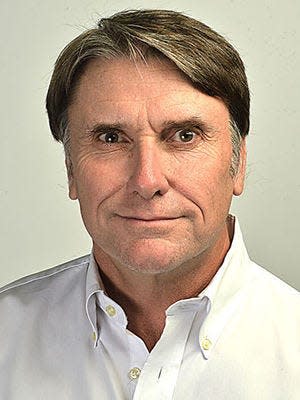Oil, gas are on our minds but not for long
Ten years ago, everyone was fretting about a jobless recovery. Today, we might be about to find out if there is such a thing as a full-employment recession.
Job figures show Hagerstown employment is close to being back to where it was prior to the pandemic, and hiring on the state level remains strong as well. Jobs are plentiful nationwide, and employers are desperate for help — to the point that one shop owner in Arizona said he’s fired an employee three different times, and each time had to go back hat in hand begging him to return.
The housing market seems destined to cool off with interest rates rising, but more than that, perhaps, because everyone who wanted to buy a house did. Corporate earnings remain strong, companies’ main lament being that they do not have enough products to sell. Inflation is high, but for the first time in 40 years wages are increasing — up 4.5% since 2020. Instead of inflation taking a bite out of wages, wages are taking a bite out of inflation.
Yet recessions can be a self-fulfilling prophecy. Get enough people worried about it, by pounding away about the “risk of recession” and people naturally become more hesitant to buy.

And if we look around for culprits responsible for our malaise, all disparate routes come back to one single source: fossil fuels. The pandemic hurt, no question, by disrupting supply chains, but it was merely gas, so to speak, on an existing fire.
Oil is inseparable from the economy and politics. The price of every product that is transported by truck, train or plane is affected by oil. Our ability to keep more of our energy at home is complicated by the knowledge that our failure to export liquified natural gas could destabilize Europe. And for all the talk of Putin’s romantic notion of reuniting the Soviet Union of old, oil is the real protagonist in the war with Ukraine.
At the ballgame:Municipal Stadium housed baseball memories for a community
But the real “problem” with oil today is that the world has finally acknowledged it needs to move on to other energy sources. It may seem as if politicians are still debating our energy future, but pay no attention to them; politicians are always the last to know.
What we are experiencing are the initial throes of a worldwide detox to its fossil fuel addiction. It’s going to be painful at times, but it is a necessary step as we transition to energy sources that will never run out and will not poison the planet.
If you are looking for perhaps the most sophisticated renewable energy project in the world you will find it at the Mohammed bin Rashid Al Maktoum Solar Park located in, wait for it, the United Arab Emirates. When OPEC nations become leaders in green energy, you know the game has changed.
More:The US has the global market cornered on scandal suffixes
They understand what’s happening, as do our own oil companies which, for all their protests, are making transitional plans of their own.
In the fall of 2018, Donald Trump rhapsodized about “clean, beautiful coal.” Four years later, we can begin to look back on this as the last time the word “coal” was used in public, at least by anyone who was engaged in promoting the delusion that, as an energy source, it has any kind of future.
Ten years before that, Maryland Lt. Gov. Michael Steele coined the phrase “Drill, Baby, Drill,” a catchphrase later picked up by vice presidential candidate Sarah Palin. But Steele and Palin didn’t own any oil rigs, and the companies that did took a pass when the Trump administration tried to get them interested in drilling on public lands.
One day, Garyville, La., may become the answer to a trivia question no one will ask: Where was the last major U.S. oil refinery built? That was back in 1977 when gas was 60 cents a gallon and oil was the future of American energy as far as all but a few doomsayer crackpots could see.
Today, the price of gas is less attributable to the availability of oil than to our lack of capacity to turn it into heating fuel and gasoline. Instead of Drill, Baby, Drill, Palin should have been saying Build Another Oil Refinery, Baby, Build Another Oil Refinery.
Instead, truckloads of rusting pipes are being hauled from refinery sites that are being torn down to make room for — as is the case in Philadelphia, a green, high-tech campus populated with e-commerce and life sciences companies.
Other refineries up for sale can’t find any takers, because the future is known: With oil prices so high, there are enormous profits to be made today. But no one, not even the most dedicated oil-patch acolytes, believes those opportunities will still exist tomorrow.
Tim Rowland is a Herald-Mail columnist.
This article originally appeared on The Herald-Mail: Oil, gas are on our minds but not for long
